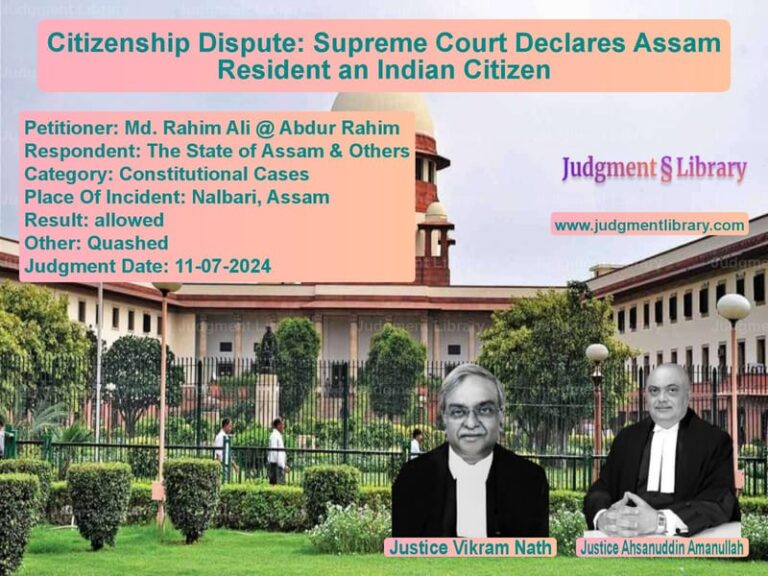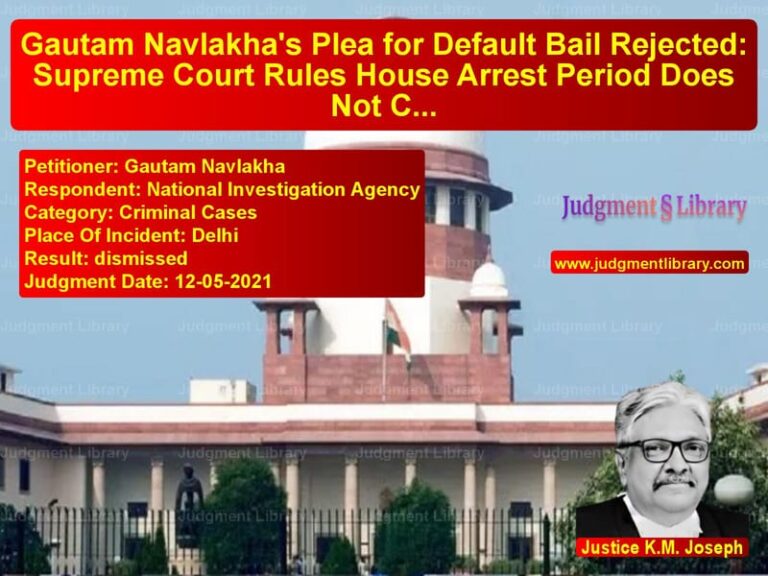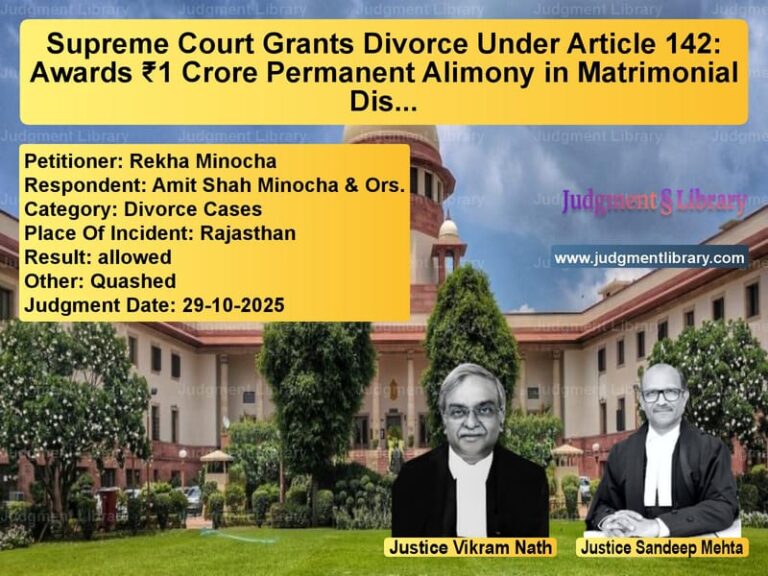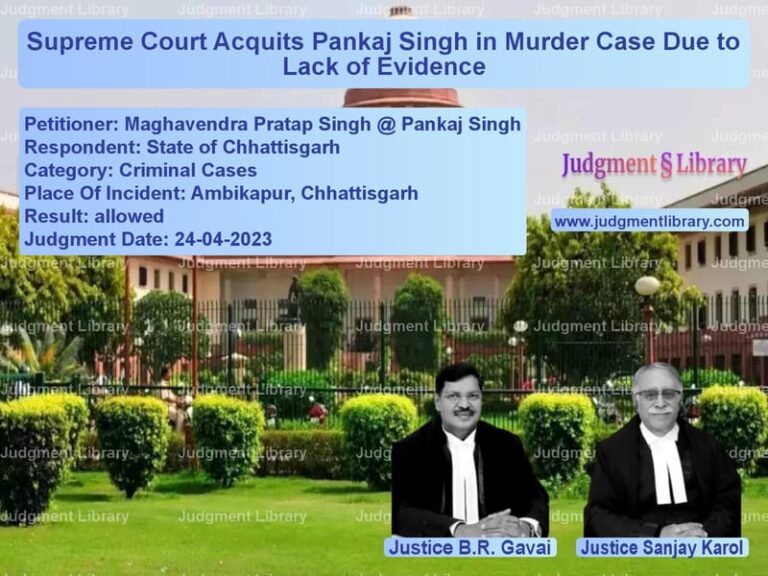Cheque Bounce Case Settled: Supreme Court Quashes Conviction Under Section 138 of NI Act
The Supreme Court recently delivered a crucial judgment in the case of B V Seshaiah & Anr. vs. The State of Telangana & Anr., addressing issues surrounding cheque bounce cases under the Negotiable Instruments Act, 1881 (NI Act). The primary question before the Court was whether a conviction under Section 138 of the NI Act could stand when the parties had already entered into a settlement agreement.
Background of the Case
The case originated from a private complaint filed by the respondent against the appellants, alleging that they had issued cheques that were dishonored due to insufficient funds. This led to criminal proceedings under Section 138 of the NI Act, which resulted in the conviction of the appellants.
During the pendency of the case, both parties signed a Memorandum of Understanding (MoU), agreeing to settle the dispute amicably. Clause 8 of the MoU specified that in case of any unresolved dispute, the matter should be referred to arbitration. Despite this agreement, the respondent failed to file a compromise petition before the High Court, leading to the dismissal of the revision petition and confirmation of the conviction.
Legal Issues Before the Supreme Court
The Supreme Court examined the following key legal issues:
- Whether a conviction under Section 138 of the NI Act can be upheld when both parties have agreed to settle the dispute.
- Whether the respondent’s failure to file a compromise petition negated the terms of the settlement agreement.
- Whether the High Court was justified in confirming the conviction despite the settlement.
Arguments by the Appellants
The appellants contended that:
“The settlement agreement signed by both parties clearly indicated their intent to amicably resolve the dispute. The conviction under Section 138 should therefore not stand, as it constitutes a compoundable offense.”
They further argued that since the MoU provided for arbitration in case of any dispute, the matter should not have been adjudicated in criminal proceedings.
Arguments by the Respondents
The respondent, however, argued:
“The MoU does not automatically absolve the appellants of criminal liability. Since the compromise petition was not filed before the High Court, the conviction remains valid.”
The respondent claimed that the High Court had correctly upheld the conviction, as the procedural requirements for compounding the offense had not been followed.
Supreme Court’s Observations
The Supreme Court examined the nature of offenses under Section 138 of the NI Act and observed:
“The nature of the offense under Section 138 is primarily related to a civil wrong. It has been specifically made a compoundable offense to encourage amicable settlements.”
The Court referred to the case of M/S Meters and Instruments Private Limited & Anr. vs. Kanchan Mehta, where it was held that:
“The object of the NI Act is to facilitate smooth business transactions. The provision is necessary as dishonored cheques cause incalculable loss, but the law also recognizes the need for settlements.”
The Supreme Court noted that the MoU clearly outlined an intent to settle the dispute. The respondent’s failure to file a compromise petition should not override the fact that the parties had agreed to resolve the matter amicably.
Final Judgment
The Supreme Court set aside the conviction and ruled:
- The conviction of the appellants by the trial court was quashed.
- The parties were directed to resolve their dispute as per the terms of the MoU.
- The Court reaffirmed that offenses under Section 138 of the NI Act are compoundable.
Implications of the Judgment
This ruling has significant implications for future cheque bounce cases:
- It reaffirms that Section 138 cases are primarily civil in nature and should be settled wherever possible.
- It sets a precedent that courts should respect settlement agreements and arbitration clauses in MoUs.
- It emphasizes that procedural lapses, such as failure to file a compromise petition, should not prevent the enforcement of settlements.
By quashing the conviction, the Supreme Court has reinforced the importance of out-of-court settlements and alternative dispute resolution mechanisms in commercial matters.
Petitioner Name: B V Seshaiah & B Vamsi Krishna.Respondent Name: The State of Telangana & Anr..Judgment By: Justice Krishna Murari, Justice V. Ramasubramanian.Place Of Incident: Telangana.Judgment Date: 01-02-2023.
Don’t miss out on the full details! Download the complete judgment in PDF format below and gain valuable insights instantly!
Download Judgment: b-v-seshaiah-&-b-vam-vs-the-state-of-telanga-supreme-court-of-india-judgment-dated-01-02-2023.pdf
Directly Download Judgment: Directly download this Judgment
See all petitions in Contract Disputes
See all petitions in Debt Recovery
See all petitions in Cheque Dishonour Cases
See all petitions in Judgment by Krishna Murari
See all petitions in Judgment by V. Ramasubramanian
See all petitions in allowed
See all petitions in supreme court of India judgments February 2023
See all petitions in 2023 judgments
See all posts in Civil Cases Category
See all allowed petitions in Civil Cases Category
See all Dismissed petitions in Civil Cases Category
See all partially allowed petitions in Civil Cases Category







